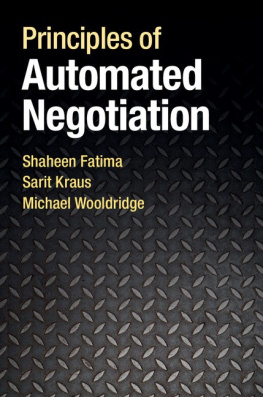First published 2015
by Routledge
2 Park Square, Milton Park, Abingdon, Oxon OX14 4RN
and by Routledge
711 Third Avenue, New York, NY 10017
Routledge is an imprint of the Taylor & Francis Group, an informa business
2015 William W. Baber and Chavi C-Y Fletcher-Chen
The right of William W. Baber and Chavi C-Y Fletcher-Chen to be identified as authors of this work has been asserted by them in accordance with the Copyright, Designs and Patent Act 1988.
All rights reserved. No part of this book may be reprinted or reproduced or utilised in any form or by any electronic, mechanical, or other means, now known or hereafter invented, including photocopying and recording, or in any information storage or retrieval system, without permission in writing from the publishers.
Trademark notice: Product or corporate names may be trademarks or registered trademarks, and are used only for identification and explanation without intent to infringe.
British Library Cataloguing-in-Publication Data
A catalogue record for this book is available from the British Library
Library of Congress Cataloging-in-Publication Data
Baber, William W.
Practical business negotiation / William W. Baber and Chavi C-Y Fletcher
Chen. 1 Edition.
pages cm
1. Negotiation in business. I. Fletcher-Chen, Chavi C.Y. II. Title.
HD58.6.B33 2015
658.4052dc23
2014044696
ISBN: 978-1-138-78147-4 (hbk)
ISBN: 978-1-138-78148-1 (pbk)
ISBN: 978-1-315-71407-3 (ebk)
Typeset in Bembo
by Apex CoVantage, LLC
Contents
Appendix V
Cultural differences
This appendix contains a few more cultural notes based on the research of Hall, Hofstede, Trompenaars and Hampden-Turner, as well as others. None of these cultural differences can always and reliably be found in any culture; please refer to the discussion in on culture and stereotyping.
Review of : culture and behavior expected at a national level does not always apply to individuals, so therefore thinking that all people from one country will behave similarly is false.
Additionally, please consider that experienced negotiators from any country may intentionally neither react nor behave like most people in their home culture.
Showing emotions
Generally, most North Americans, Europeans and people in these language groups show their emotions more obviously than East Asians do; culture researchers call this being affective. Affective means that they are more likely to show that they are frustrated, satisfied, happy, uncomfortable, etc. by speaking or by body language Although they show emotions easily, they may not be able to read emotions well!
Reading emotions
Generally, the cultures of North America and Northern Europe are low context, which means they may have difficulty reading facial expressions, tone of voice and other body language. They prefer to get information in the form of direct words and phrases.
The result is that affective, low context cultures communicate a lot of information, but cannot read the same information as well from opposite cultures. Therefore, East Asian negotiators may be able to clearly understand the feelings of counterparties from those cultures. But the North American and Northern Europeans may not be able to read the East Asian side.
Advantage for
Unless one side is trying to deceive the other, there is no deep advantage. But there is a strong chance of miscommunication because North Americans and many Europeans could fail to understand the East Asian side. Therefore, the East Asian side should make their feelings about progress, satisfaction, likes and dislikes clearly and explicitly known in words to negotiators from North America and Europe. How? They should try to put their feelings into words, and they should try to use stronger body language with some cultures than they use in their own culture. This process is called accommodating the other side. Do not try to completely accommodate negotiators from other cultures, but do try to be sensitive and a little bit accommodating as you communicate with them. Adjusting in small steps will help the mutual accommodation of all parties.
Too much cultural accommodation
If both sides accommodate too much, no one will be able to correctly understand their words and body language. What to do? Accommodate a little, but not too much. Accommodate more as you become more deeply familiar with local expectations and practices. When you are not sure, ask for information using simple sentences and get advice from individuals with high experience in your culture and the culture you are targeting.
Building trust across cultures in negotiation
Jang and Chua (2011) identify a difficulty that negotiators face when dealing with parties from other cultures. The very behaviors that help you build trust in your culture may cause misunderstanding and mistrust with parties from other cultures. With people from your own cultural background, you know and can use the correct combinations of phrases, the right kind of eye contact, appropriate posture and so on that leads toward trusting relationships. Your idea about this script of actions might, however, lead to the wrong results with people from other backgrounds. In order to manage this process and to learn suitable approaches and scripts of action, Jang and Chua suggest active learning of cultural intelligence (CQ). You can learn more about CQ at http://www.culturalq.com.
Time
People from different cultures may understand time very differently. Most North Americans and many Europeans feel that time must be used effectively to gainprogress. In negotiations, they may have limited time available and feel pressure to finish an agreement. Because of this pressure, inexperienced negotiators may give concessions when they get close to their deadline.
Misunderstanding perceived value of time
| Conversation | Comments |
|
| Smith: I cant believe it we have been talking about this all day with no conclusions! | This negotiator is showing his impatience. Within the US, this would be an easily understood signal that means: Lets stop wasting time and agree to some concrete details. |
| Outside the US, Smiths words might be misunderstood in many ways. |
| Tanaka: I see. Can we discuss the part about marketing again? | This negotiator does not recognize the signal from Smith and continues with a slow process. |
| Smith: Why? We talked about it for 45 minutes! Its clear that you dont care about progress. Thats enough. Lets move on to some solid numbers. | Smith gets even more upset. |
| Tanaka: Ok. Lets move on to the related data. We should analyze this together. It will only take a few hours. | Tanaka seems to understand the need to move on. But he did not communicate his understanding to Smith. Worse, he suggested another long, slow process. |
| Smith: No. Maybe we should not. I have to visit a company in Taiwan. I hear they like to do business fast. | Smith has given up and ran. Even if we consider Smith too impatient, this is a failure for both Smith and Tanaka. |
Improved conversation about time
| Conversation | Comments |
|
| This negotiator is showing his impatience. |
|












